Speaker
Ioan Valentin CERNEA
(University of Medicine and Pharmacy "Iuliu Hatieganu" Cluj-Napoca, ROMANIA)
Description
Background: In Romania cancer patient’s access to radiotherapy services is far below the standard of EU countries. Access to radiotherapy of cancer patients is currently approximately 30% compared to 47-50% according to international recommendations. Radiotherapy centers network in Romania is currently in development in both the public and private sectors. Cobalt devices have been replaced in most centers, 3D conformal techniques are standard in most of them and in some centers IMRT techniques are used.
In these circumstances the training of human resources involved in radiotherapy services (doctors, medical physicists, RTT’s) should be a major concern of universities and other institutions providing services is education.
Competency based RTT’s education
Traditionally RTT training in Romania was not specific for radiotherapy most of these specialists being educated as radiology technicians. University of Medicine and Pharmacy "Iuliu Hatieganu" in Cluj-Napoca is still educate since 2000’s radiology technicians in the frame of a study program of 180 European Credit Transfer and Accumulation System (ECTS)
Beginning with the academic year 2016-2017 curricula of training of this study program was restructured to include more theoretical concepts and practical applications dedicated to radiotherapy. The total number of 180 ECTS is preserved and is performed over 3 years. The umber of hours of courses and internships to develop skills related to radiotherapy has been increased and represents 40 ECTS, which is double compared to the previous curricula. To establish the new curricula, the IAEA recommendation for training and education of RTT was used.
The purpose of these changes was to provide future professionals a basic level of skills that enable them on the one hand a safe practice of radiotherapy activities and on the other hand to possess the cognitive skills necessary for lifelong learning in a professional environment in constant change.
Beginning in academic year 2017 is scheduled to introduce a master program degree study for RTT’s order to increase competencies specific to radiotherapy after graduation.
Conclusion
The development of technical infrastructure of radiotherapy departments in Romania requires adapting the educational offer to the needs of the labor market. RTT’s must have knowledge and practical abilities to adapt to a complex work environment.
At the University of Medicine and Pharmacy in Cluj Napoca there is a study program of 180 ECTS that has been modernized starting with academic year 2016 to include an increased number of courses and practical activities dedicated to radiotherapy. It is so far the only University in Romania that offers such a program of study and we believe that extending it to other Universities will be mandatory in the coming years as a necessity required by the practical realities of the development of radiotherapy activities.
| Institution | University of Medicine and Pharmacy |
|---|---|
| Country | ROMANIA |
Author
Ioan Valentin CERNEA
(University of Medicine and Pharmacy "Iuliu Hatieganu" Cluj-Napoca, ROMANIA)
Co-authors
Alexandru IRIMIE
(University of Medicine and Pharmacy “Iuliu Hatieganu”, ROMANIA)
Anca Dana BUZOIANU
(University of Medicine and Pharmacy “Iuliu Hatieganu”, ROMANIA)
Sorin DUDEA
(University of Medicine and Pharmacy “Iuliu Hatieganu”, ROMANIA)
Viorica NAGY
(University of Medicine and Pharmacy “Iuliu Hatieganu”, ROMANIA)

